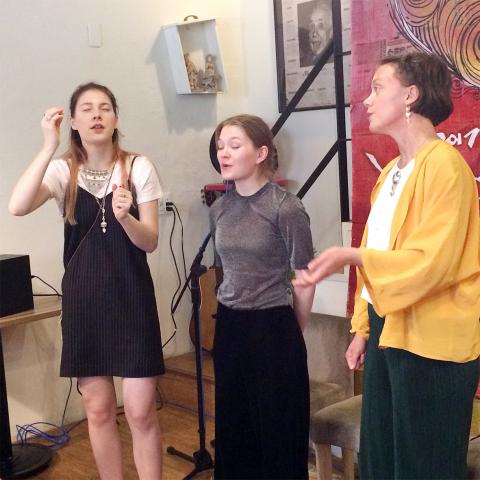Taipei hosts the 15th Migration Music Festival (流浪之歌音樂節) this weekend, with folk musicians from a variety of cultures coming to perform.
This year features an all-female line up of 11 acts from nine countries. The theme, “I’m not in my room” is a nod to Virginia Woolf, who famously said “a room of one’s own” was a necessity for women writers to flourish. The festival celebrates creative women breaking boundaries in the world of music.
Trees Music and Art’s (大大樹音樂圖像) artistic director Chung She-fong (鍾適芳) says she knew all the artists personally and wanted to create an event where they could all gather and share their talent.

Photo Courtesy of Trees Music and Art
“We hope to encourage female artists through this event,” Chung says. “Women face more obstacles as artists.”
Many of the invited performers took the stage at a press conference yesterday. Flamenco-inspired notes emerge from the guitar of Portuguese singer-songwriter Lula Pena, as her deep, husky voice holds the audience captive.
The Norwegian and Swedish trio of Golbma Jiena sing traditional pieces in the Sami language in three-part harmony, playing with glottal stops and contorting their bodies to produce other-worldly sounds.
The festival will not only showcase music rarely heard in Taiwan, but also screen short documentaries which tell stories of women who undergo great sacrifices to make music. Open discussions and storytelling will follow each screening.
The main performance space will be Zhongshan Hall (中山堂), with performances also held in small studios and cafes around Taipei, Chung says.
This year’s line up includes acts from as far afield as Somaliland and Scandinavia, as well as Taiwan’s own Aboriginal singer-songwriter Panai Kusui.

In the March 9 edition of the Taipei Times a piece by Ninon Godefroy ran with the headine “The quiet, gentle rhythm of Taiwan.” It started with the line “Taiwan is a small, humble place. There is no Eiffel Tower, no pyramids — no singular attraction that draws the world’s attention.” I laughed out loud at that. This was out of no disrespect for the author or the piece, which made some interesting analogies and good points about how both Din Tai Fung’s and Taiwan Semiconductor Manufacturing Co’s (TSMC, 台積電) meticulous attention to detail and quality are not quite up to

It is one of the more remarkable facts of Taiwan history that it was never occupied or claimed by any of the numerous kingdoms of southern China — Han or otherwise — that lay just across the water from it. None of their brilliant ministers ever discovered that Taiwan was a “core interest” of the state whose annexation was “inevitable.” As Paul Kua notes in an excellent monograph laying out how the Portuguese gave Taiwan the name “Formosa,” the first Europeans to express an interest in occupying Taiwan were the Spanish. Tonio Andrade in his seminal work, How Taiwan Became Chinese,

Mongolian influencer Anudari Daarya looks effortlessly glamorous and carefree in her social media posts — but the classically trained pianist’s road to acceptance as a transgender artist has been anything but easy. She is one of a growing number of Mongolian LGBTQ youth challenging stereotypes and fighting for acceptance through media representation in the socially conservative country. LGBTQ Mongolians often hide their identities from their employers and colleagues for fear of discrimination, with a survey by the non-profit LGBT Centre Mongolia showing that only 20 percent of people felt comfortable coming out at work. Daarya, 25, said she has faced discrimination since she

April 21 to April 27 Hsieh Er’s (謝娥) political fortunes were rising fast after she got out of jail and joined the Chinese Nationalist Party (KMT) in December 1945. Not only did she hold key positions in various committees, she was elected the only woman on the Taipei City Council and headed to Nanjing in 1946 as the sole Taiwanese female representative to the National Constituent Assembly. With the support of first lady Soong May-ling (宋美齡), she started the Taipei Women’s Association and Taiwan Provincial Women’s Association, where she